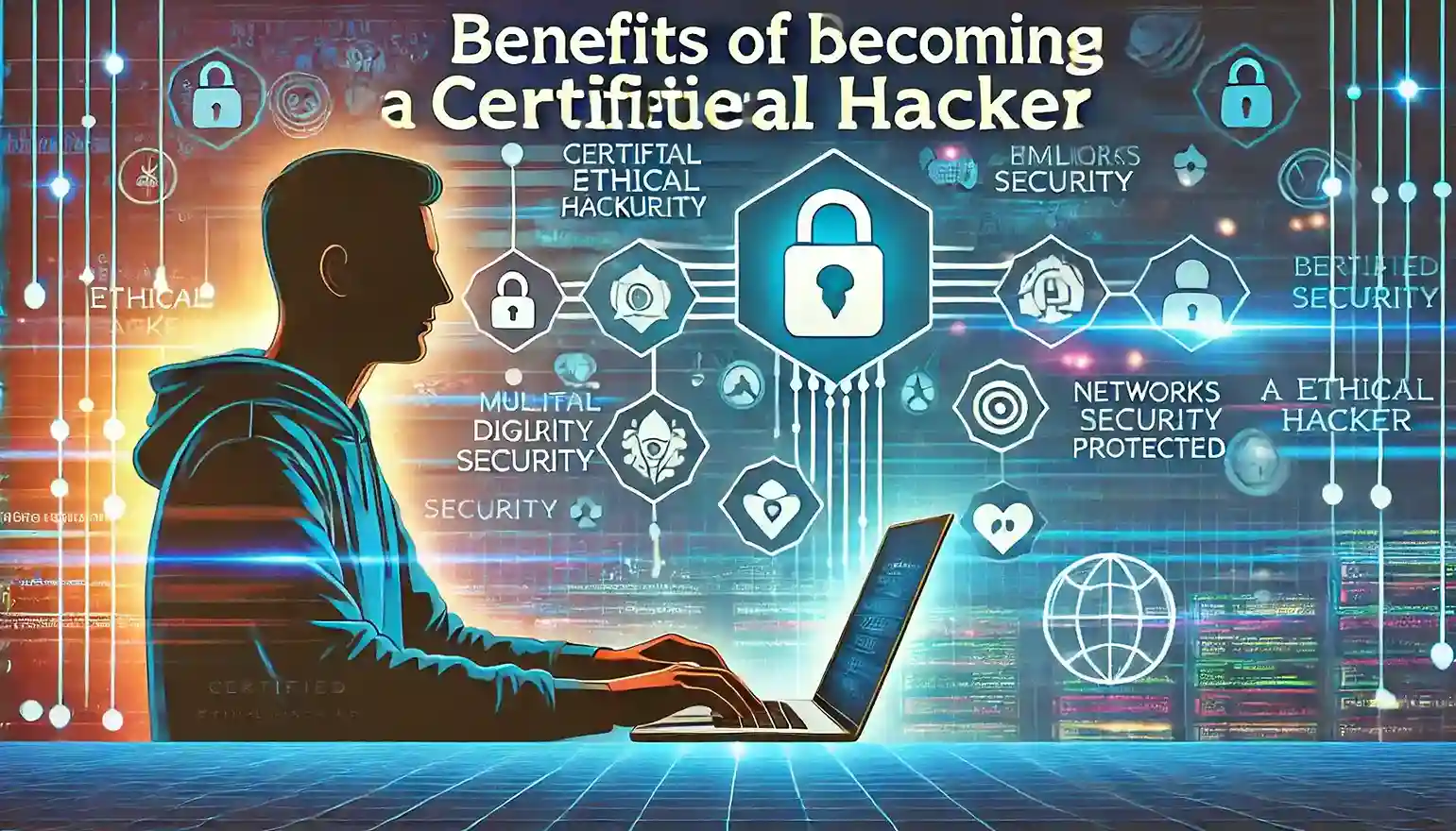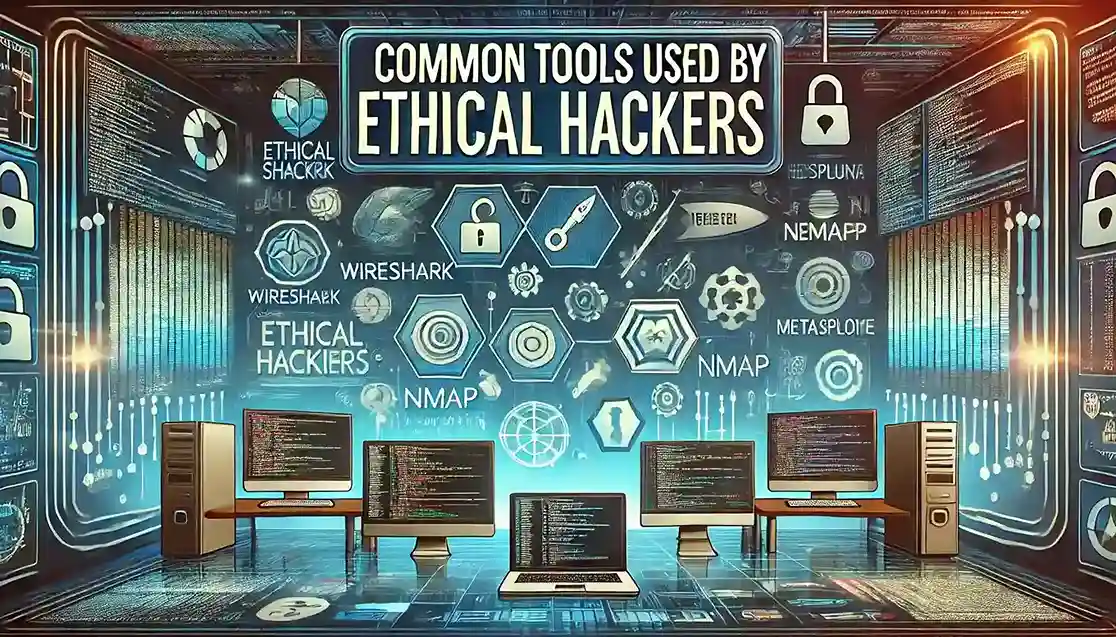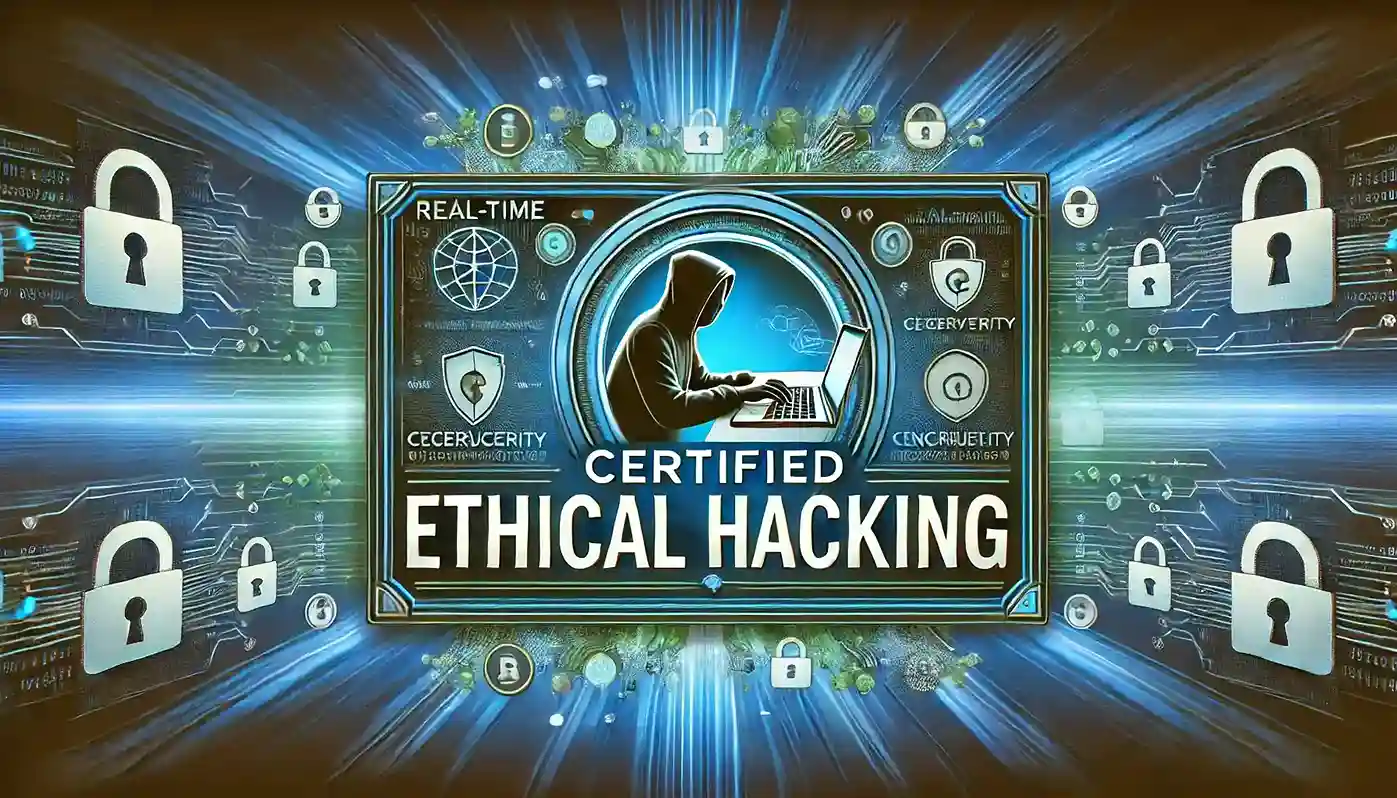Certified Ethical Hacking (CEH)
In today’s increasingly digital world, cybersecurity threats are growing in both frequency and sophistication. With the proliferation of hacking incidents and data breaches, the demand for skilled professionals who can protect organizations from cyberattacks has never been higher. Certified Ethical Hacking professionals are ethical hackers, sometimes referred to as “white hat hackers,” who use their expertise in hacking to help organizations identify vulnerabilities in their systems and secure them against malicious attacks.
What is a Certified Ethical Hacking?
A Certified Ethical Hacking (CEH) is a cybersecurity professional trained to think and act like a hacker but with legal and ethical intentions. Their goal is to expose vulnerabilities in networks, applications, and systems to help organizations defend against real-world cyberattacks. Ethical hackers perform various types of penetration testing, security assessments, and risk analysis to uncover weaknesses before malicious hackers can exploit them.
To become a certified ethical hacker, professionals must pass the certified ethical hacker exam, which is administered by the International Council of E-Commerce Consultants (EC-Council). The certification is globally recognized and is a hallmark of proficiency in the world of cybersecurity & Certified Ethical Hacking.
The Evolution of Ethical Hacking
Hacking has existed since the dawn of computer systems, with early hackers primarily focusing on testing the limits of technology. However, the landscape of hacking began to shift as cyberattacks became more financially and politically motivated. The rise of organized cybercrime and state-sponsored hacking underscored the need for a defence mechanism, paving the way for the concept of ethical hacking.
In the early 2000s, ethical hacking transitioned from an obscure practice to a mainstream profession, as organizations began hiring ethical hackers to strengthen their cybersecurity frameworks. The EC-Council introduced the Certified Ethical Hacker certification as a standardized way to train and recognize skilled ethical hackers.
Why Ethical Hacking is Critical Today
In the current era of digital transformation, nearly every organization depends on online systems, networks, and cloud-based platforms to operate. This increased reliance on technology makes organizations prime targets for cyberattacks. Every sector, from finance and healthcare to government and education, is vulnerable to hacking attempts. Cybercriminals exploit system weaknesses, steal sensitive data, and cause costly disruptions.
Certified Ethical Hacking are crucial in this fight against cybercrime. By conducting authorized penetration testing, ethical hackers uncover security gaps before black hat hackers do. This proactive approach prevents data breaches, intellectual property theft, and reputational damage for organizations. In essence, ethical hacking is a vital component of modern cybersecurity.
A Certified Ethical Hacker (CEH) plays a significant role in strengthening an organization’s cybersecurity infrastructure. Their primary responsibility is to protect systems and data by thinking like an adversary, identifying vulnerabilities, and applying corrective measures to secure systems. Let’s break down the core tasks and responsibilities they handle:
Identifying System Vulnerabilities
One of the most important responsibilities of a certified ethical hacker is to identify potential vulnerabilities in an organization’s network and applications. They do this by scanning for weak points in the system, such as:
- Outdated software or unpatched systems
- Unprotected databases
- Open ports and improperly configured firewalls
By conducting a vulnerability assessment, ethical hackers help organizations prioritize which weaknesses need immediate attention, ensuring critical systems remain protected.
Penetration Testing
Penetration testing, or “pen testing,” is the process of simulating real-world cyberattacks to test the security of a system.
- Attempt to break into systems just like a malicious hacker would
- Use various hacking tools to exploit vulnerabilities in the network
- Document the methods and techniques used to infiltrate the system
Pen testing allows organizations to understand how vulnerable they are to different attack vectors, and it gives them a clear action plan for improving security.
Reporting and Fixing Security Breaches
Once vulnerabilities are identified and penetration tests are complete, ethical hackers document their findings and provide detailed reports to the organization’s IT and security teams. These reports include:
- A summary of vulnerabilities discovered
- The potential impact of each vulnerability if exploited
- Recommended solutions and preventive measures
Beyond identifying issues, Certified Ethical Hacking may assist in implementing security patches, reconfiguring firewalls, or strengthening user authentication processes to ensure systems are secure. Their goal is not only to detect vulnerabilities but also to help mitigate risks and prevent future breaches.
Key Skills Required for Ethical Hacking
Becoming a Certified Ethical Hacker requires a solid understanding of various technical domains, as the role demands deep expertise in systems, networks, and security protocols. Ethical hackers must be able to think like cybercriminals to anticipate and thwart potential attacks. Below are some of the critical skills needed to succeed in this field:
Networking Knowledge
Networking forms the backbone of ethical hacking. As networks are the primary targets for hackers, an ethical hacker needs to understand how networks function and how data moves within them. Essential concepts include:
- TCP/IP Protocols: Understanding how the internet works through these protocols helps ethical hackers assess vulnerabilities in data transmission.
- Firewalls and Routers: Ethical hackers need to know how firewalls operate, what rules they follow, and how they can be bypassed if misconfigured.
- Subnets and Network Segmentation: Familiarity with network architecture enables ethical hackers to identify potential areas of exposure in segmented environments.
A strong foundation in networking allows ethical hackers to analyze and penetrate networks effectively, helping organizations bolster their security.
Proficiency in Operating Systems (Windows)
Certified Ethical Hacking must be well-versed in multiple operating systems to exploit vulnerabilities and test security measures across diverse platforms. The two key operating systems to master are:
- Windows: Given its widespread use in business and corporate environments, understanding Windows internals, security configurations, and known vulnerabilities is crucial for ethical hackers.
In-depth knowledge of both operating systems gives ethical hackers the flexibility to assess and defend against attacks targeting various platforms.
Familiarity with Hacking Tools and Software
Certified Ethical Hacking relies on a wide range of specialized tools to assess the security of systems and applications. Some of the most popular tools used by ethical hackers include:
- Nmap: A network scanning tool that identifies open ports, active devices, and potential vulnerabilities in a network.
- Wireshark: A network protocol analyzer used to capture and analyze traffic and help ethical hackers identify anomalies.
- Metasploit: A powerful framework for penetration testing, enabling ethical hackers to test for known vulnerabilities and exploit them to understand the impact.
These tools, combined with an understanding of scripting and automation, help ethical hackers perform more effective penetration tests and security assessments.
Benefits of Becoming a Certified Ethical Hacking

Ethical hacking has emerged as one of the most sought-after careers in cybersecurity. By becoming a Certified Ethical Hacking professionals not only enhance their technical skills but also gain access to a wide range of lucrative and impactful opportunities.
High Demand for Cybersecurity Experts
With the increasing number of cyber threats worldwide, the demand for skilled cybersecurity professionals, including ethical hackers, has skyrocketed. Governments, corporations, and non-profits are all actively seeking individuals who can help them secure their digital assets. The demand is driven by:
- Increasing cybercrime: The rise in ransomware, phishing attacks, and data breaches makes ethical hackers indispensable Certified Ethical Hacking.
- Data privacy regulations: New laws like GDPR require organizations to strengthen their security frameworks, creating a greater need for CEHs to perform regular assessments.
The shortage of cybersecurity professionals means that ethical hackers are in high demand, providing job security and a steady influx of opportunities.
Attractive Salary Packages
Certified Ethical Hacking are compensated well for their specialized skill sets. The average salary for a certified ethical hacker in the United States typically ranges from $70,000 to $120,000 per year, with more experienced professionals or those working in high-stakes industries earning even more. Factors that influence salary include:
- Level of experience: Senior-level ethical hackers with years of experience or those holding advanced certifications can command higher pay.
- Industry: Sectors like finance, healthcare, and defence often offer premium salaries due to the sensitive nature of their data.
Additionally, ethical hackers may also receive bonuses, stock options, or other incentives, especially in organizations where they play a critical role in preventing costly breaches Certified Ethical Hacking.
Contribution to National Security and Data Protection
Becoming a Certified Ethical Hacker also allows professionals to contribute meaningfully to the broader goal of securing sensitive information and protecting national assets. Ethical hackers often work with:
- Government agencies: Many Certified Ethical Hacking are employed by defence or intelligence agencies to safeguard national infrastructure and prevent cyber espionage.
- Private enterprises: From financial institutions to healthcare providers, ethical hackers play a critical role in protecting consumer data and preventing the theft of intellectual property.
Ethical hackers help create a safer, more secure digital world by exposing system weaknesses before malicious actors can exploit them. This sense of purpose and contribution to the greater good is a significant motivator for many cybersecurity professionals.
Certified Ethical Hacker Exam Overview and Format
The certified ethical hacker exam is designed to test a candidate’s understanding of ethical hacking concepts and their ability to perform penetration testing and vulnerability assessments. The exam format includes:
- Number of Questions: 125 multiple-choice questions
- Time Limit: 4 hours
- Question Types: The questions assess various topics, including network security, malware threats, hacking techniques, web application security, and cryptography.
To pass, candidates need to demonstrate knowledge of hacking tools, techniques, and the legal implications of hacking. The exam is challenging, and thorough preparation is required to succeed.
Training and Study Resources
To prepare for the Certified Ethical Hacking exam, candidates have access to numerous training and study resources. The EC-Council offers official study materials, including:
- CEH Training Course: This is an instructor-led or self-paced online course that covers all modules of the exam, including network security, system hacking, and web application security.
- CEH v11 Study Guide: The official study guide provides in-depth coverage of all exam topics and is an essential resource for preparation.
- Practice Labs and Simulations: The EC-Council iLabs provide hands-on practice in a controlled environment, allowing candidates to perform real-world hacking tasks without risk.
There are also several third-party resources available, including books, practice exams, and video tutorials, which can supplement the official materials and aid in effective preparation.
Different Types of Ethical Hacking
Certified Ethical Hacking specializes in various areas, depending on the systems and assets they aim to protect. The types of hacking they perform range from penetrating network defences to exploiting weaknesses in web applications. Here are the three primary types of ethical hacking:
Network Hacking
Network hacking involves gaining unauthorized access to a computer network or its components, such as routers, switches, and firewalls, to identify vulnerabilities. Ethical hackers perform network hacking to help organizations secure their network infrastructure from external attacks. The process includes:
- Scanning for Open Ports: Tools like Nmap are used to scan for open ports that can be exploited by attackers.
- Assessing Firewalls: Ethical hackers analyze firewall configurations to ensure that there are no loopholes or weak spots that hackers could exploit.
- Man-in-the-Middle Attacks (MITM): Ethical hackers test for vulnerabilities that could allow an attacker to intercept communication between two parties.
The primary goal is to find weak points in the network and implement security measures before a malicious hacker can exploit them.
Web Application Hacking
With the rise of online applications and cloud-based services, web application hacking has become a critical area of focus for ethical hackers. In this type of hacking, ethical hackers attempt to exploit vulnerabilities in web-based applications to help companies fix them before they lead to security breaches. Common vulnerabilities include:
- Cross-Site Scripting (XSS): This occurs when an attacker injects malicious scripts into a website, which are then executed in the user’s browser, often without their knowledge.
- Broken Authentication: Ethical hackers check for vulnerabilities in login systems that might allow unauthorized users to gain access to sensitive data.
Web application hacking helps organizations secure their online services, protecting user data and preventing breaches.
Social Engineering Attacks
Social engineering is one of the most challenging types of hacking because it involves manipulating people rather than technology. Ethical hackers simulate social engineering attacks to test an organization’s security policies and staff awareness.
- Phishing: Attackers send fake emails or messages designed to trick users into revealing sensitive information, such as passwords or credit card details.
- Pretexting: Hackers create a fabricated scenario to obtain private information from the target.
- Baiting: This tactic involves offering something enticing (like a free USB drive) to lure a victim into unwittingly downloading malware or providing confidential information.
By performing social engineering tests, ethical hackers help organizations strengthen their human defences against these types of attacks.
Common Tools Used by Ethical Hackers

Certified Ethical Hacking uses a variety of specialized tools to identify system vulnerabilities, simulate attacks, and assess an organization’s security posture.
Wireshark
Wireshark is a powerful open-source network protocol analyzer. It allows ethical hackers to capture and analyze the data travelling across a network in real-time. By dissecting the packets of information, hackers can identify vulnerabilities, diagnose issues, and monitor network traffic. Some key uses of Wireshark include:
- Packet Sniffing: Ethical hackers can capture packets to analyze them for signs of security threats like unauthorized access, unusual traffic, or network misconfigurations.
- Troubleshooting Network Performance: Wireshark helps identify network bottlenecks, latency issues, and traffic anomalies, making it an indispensable tool for securing networks.
- Analyzing Malicious Activity: Hackers can use Wireshark to identify malicious activities such as phishing attempts, DDoS attacks, or data exfiltration efforts.
Wireshark is especially useful for ethical hackers tasked with monitoring large-scale networks, making it a go-to tool in their cybersecurity toolkit.
Metasploit
Metasploit is one of the most popular penetration testing frameworks used by ethical hackers to identify vulnerabilities and exploit them. It is widely used for simulating real-world attacks and assessing the security of an organization’s system. Key features include:
- Exploit Modules: Metasploit provides an extensive library of pre-written exploits for various system vulnerabilities. Ethical hackers can use these to simulate attacks and test defences.
- Payloads: These are specific pieces of code that an ethical hacker can insert into a vulnerable system to determine its response to an attack. Payloads in Metasploit are designed to help ethical hackers gain access, control, or retrieve information from a compromised system.
- Post-Exploitation: After an exploit is successful, Metasploit helps hackers assess the depth of the breach, maintain access, and recommend appropriate remediation measures.
Metasploit’s versatility and wide range of available exploits make it a critical tool in penetration testing and vulnerability assessments.
Nmap
Ethical hackers rely on Nmap to scan networks for open ports, services, and potential vulnerabilities. Some of its main features include:
- Port Scanning: Nmap helps ethical hackers detect open ports on a network, which may indicate vulnerabilities. Attackers often target open ports to gain unauthorized access to a system.
- Service and OS Detection: Nmap identifies the services running on each host and determines the operating systems in use, allowing hackers to better understand potential attack vectors.
- Network Mapping: Ethical hackers use Nmap to map out an organization’s network architecture, identifying all connected devices, firewalls, and routers to pinpoint weak spots in the infrastructure.
Nmap’s combination of network discovery and vulnerability scanning makes it a fundamental tool for ethical hackers, especially during the reconnaissance phase of penetration testing.
Industries that Need Certified Ethical Hacking
As cyber threats continue to evolve, certain industries are at greater risk of attack due to the sensitive nature of the data they handle. Certified Ethical Hacking play a crucial role in protecting these industries from cybercriminals. Below are some of the industries that have the greatest need for ethical hackers:
Finance and Banking
The finance and banking industry is one of the most attractive targets for cybercriminals due to the large amounts of sensitive financial data they handle. Ethical hackers are essential for safeguarding this data and preventing devastating cyberattacks. The major threats faced by this industry include:
- Financial Fraud: Hackers attempt to steal money or financial information through phishing scams, account takeovers, or unauthorized transactions.
- Ransomware Attacks: Cybercriminals may hold banking institutions hostage by encrypting their data and demanding large ransom payments to restore access.
- Data Breaches: Hackers target customer financial records, credit card information, and personal details to commit identity theft.
Certified Ethical Hacking working in this industry performs penetration testing, risk assessments, and real-time security monitoring to prevent breaches and maintain customer trust.
Government Agencies and Defense

Government agencies and the defence sector manage critical infrastructure, sensitive national data, and defence systems, making them prime targets for cyber espionage and state-sponsored attacks.
- Securing National Security Data: Government systems store highly classified information on defence capabilities, diplomacy, and national strategies. Ethical hackers are tasked with defending these systems from foreign entities.
- Preventing Espionage: Cyberattacks launched by foreign governments or organizations often aim to steal sensitive information, disrupt services, or undermine national security. Ethical hackers anticipate these threats and strengthen defences.
- Protecting Critical Infrastructure: Energy grids, transportation systems, and other national infrastructures are increasingly controlled by digital systems, making them vulnerable to cyberattacks. Certified Ethical Hacking work to prevent potentially catastrophic attacks on these vital services.
The government sector frequently hires Certified Ethical Hacking to conduct penetration testing, perform forensic analysis, and secure national assets against cyber threats.
Healthcare and Insurance
The healthcare and insurance sectors have seen a surge in cyberattacks, primarily due to the value of personal health information (PHI) stored in their databases. Ethical hackers help protect the sensitive data handled by these industries. Common threats include:
- Data Breaches: Hackers often target healthcare systems to steal PHI, which can be sold on the black market or used for identity theft.
- Ransomware: Hospitals and clinics are frequently attacked by ransomware, where hackers lock systems and demand payment in exchange for restoring patient data access.
- Medical Device Vulnerabilities: With the rise of internet-connected medical devices, hackers may attempt to compromise devices such as pacemakers or insulin pumps, putting patients at physical risk Certified Ethical Hacking.
Certified Ethical Hacking perform risk assessments, secure electronic health record (EHR) systems, and implement safeguards to ensure that patient data remains private and secure.
Challenges and Ethical Dilemmas Faced by Certified Ethical Hacking
Certified Ethical Hacking (CEHs) face several challenges and ethical dilemmas in their professional practice. The complexities of their work often involve navigating legal grey areas, maintaining the balance between security and privacy, and staying ahead of evolving cyber threats. Below are some of the key challenges they encounter:
Legal Implications of Ethical Hacking
Ethical hacking operates in a unique space where hackers are legally authorized to penetrate systems to expose vulnerabilities. However, there are strict legal guidelines and ethical codes that CEHs must adhere to, and any deviation from these can have serious consequences. Key legal challenges include:
- Permission and Authorization: Ethical hackers must obtain explicit permission from organizations to conduct penetration testing. Unauthorized hacking, even with good intentions, can lead to severe legal penalties.
- Compliance with Data Protection Laws: Certified Ethical Hacking must ensure their hacking activities comply with data privacy regulations, such as GDPR, HIPAA, and other local laws, which impose strict guidelines on data access and handling.
- Responsibility of Disclosure: Ethical hackers are sometimes faced with the ethical dilemma of whether to report discovered vulnerabilities publicly, which could lead to misuse, or keep the information confidential to allow the organization to fix the issue privately.
Understanding the legal landscape and operating within the boundaries of authorization is critical for CEHs to avoid legal repercussions.
Balancing Security and Privacy

Another major challenge for Certified Ethical Hacking is maintaining the delicate balance between improving security and respecting privacy rights. Ethical hackers often have access to sensitive information, and it’s essential to protect this data while addressing security concerns. Dilemmas arise in cases such as:
- Overreaching into Private Data: During penetration testing, ethical hackers may come across private data, such as personal or financial information, that is unrelated to their work. Ethical considerations dictate that they must respect the privacy of individuals and refrain from viewing or using this data.
- Security vs. User Convenience: Strengthening security measures often involves imposing restrictions on users, such as implementing complex authentication protocols. Ethical hackers must advise on how to balance security needs without making the system too cumbersome for users.
CEHs must work closely with organizations to ensure that security measures do not infringe on individual privacy rights and maintain user trust.
Staying Ahead of Black Hat Hackers
The dynamic nature of cybersecurity means that black hat hackers are constantly evolving their tactics, techniques, and procedures (TTPs) to exploit new vulnerabilities. Ethical hackers face the challenge of staying ahead of these cybercriminals. Some of the key difficulties include:
- Rapid Advancements in Hacking Tools: Malicious hackers continuously develop new tools and exploit techniques, making it challenging for ethical hackers to stay up to date.
- Zero-Day Vulnerabilities: CEHs must constantly look for emerging threats and vulnerabilities, especially zero-day exploits, which are vulnerabilities that have not yet been discovered or patched by the vendor.
- Constant Need for Learning: Ethical hackers must remain proactive in expanding their knowledge and learning about the latest trends in cybercrime to anticipate and counter new attack vectors.
The race between Certified Ethical Hacking and malicious attackers is ongoing, requiring Certified Ethical Hacking to stay informed and vigilant in their work.
Joining Cybersecurity Communities
One of the most effective ways to stay updated is by participating in cybersecurity communities. These online and offline forums allow ethical hackers to exchange information, share the latest hacking techniques, and discuss emerging threats. Popular communities include:
- Reddit (r/cybersecurity, r/hacking): These subreddits offer discussions, news, and resources on the latest cybersecurity threats and trends.
- Bug Bounty Platforms: Participating in bug bounty programs like HackerOne or Bugcrowd not only helps CEHs test their skills but also keeps them aware of the latest vulnerabilities being discovered across various industries.
- Discord Servers and Slack Groups: Many cybersecurity professionals join niche communities where they can collaborate, share tools, and discuss the newest developments in ethical hacking.
Conclusion
The field of Certified Ethical Hacking is dynamic, demanding, and increasingly essential in today’s digital age. As cyber threats become more sophisticated, the need for skilled professionals who can anticipate, detect, and neutralize these threats is more critical than ever. By obtaining a Certified Ethical Hacking certification, professionals not only elevate their career prospects but also play a vital role in safeguarding data and systems globally. Ethical hackers are the frontline defenders against cybercrime, making their contributions invaluable to organizations across all sectors.
Frequently Asked Questions (FAQs)
Q1: Do you need programming knowledge to become a Certified Ethical Hacking?
Yes, basic to advanced programming knowledge is beneficial, especially for scripting, automation, and understanding how software vulnerabilities work.
Q2: Is Certified Ethical Hackingcertification globally recognized?
Yes, Certified Ethical Hacking certification by the EC-Council is recognized internationally and is a standard in many cybersecurity roles.
Q3: What’s the difference between a black hat and an ethical hacker?
Black hat hackers hack for malicious purposes, whereas ethical hackers use their skills to protect and secure systems legally.
Q4: Which industries hire Certified Ethical Hacking the most?
Financial services, government, defence, healthcare, and technology sectors are some of the top employers for Certified Ethical Hacking-certified professionals.
Q5: What other certifications are recommended after Certified Ethical Hacking?
Certifications like CISSP, OSCP, or CISM are highly valued for advancing in the field of cybersecurity after obtaining Certified Ethical Hacking.
